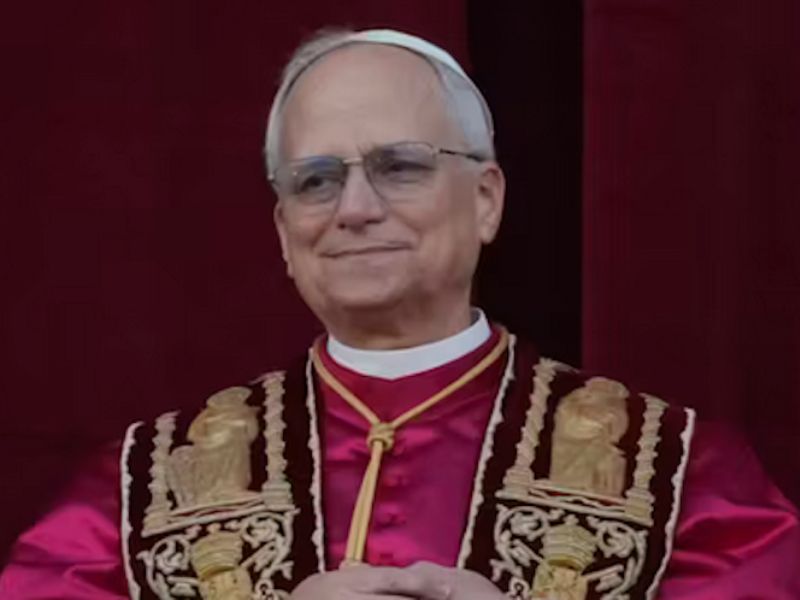A Rising Hope: Pope Leo XIV’s Call to End Christian Persecution

By Lisa Navarrette, ICC Fellow
In a world where violence and repression continue to threaten religious minorities, the voice of one spiritual leader has begun to cut through the noise with uncommon clarity and moral authority.
Pope Leo XIV, the recently elected head of the Roman Catholic Church, has emerged as a bold and compassionate advocate for persecuted Christians around the world. His early papacy is already marked by impassioned pleas, concrete diplomatic outreach, and a vision of peace rooted in justice and protection for the vulnerable.
Pope Leo’s commitment to ending Christian persecution has been more than rhetorical. From his earliest public addresses to recent diplomatic actions, he has made it clear that defending persecuted Christians is a priority, not just for the church, but for all people of goodwill. This papacy is already inspiring renewed hope among communities that have long suffered in silence.
From the outset, Pope Leo has used his platform to draw attention to the plight of Eastern Rite Catholics and other Christian communities living under threat. In one of his first major addresses, the pope specifically acknowledged the violence and discrimination that Christians face in the Middle East, Africa, and parts of Asia, offering both solidarity and a firm call for international action. He highlighted the grave and growing threats that many Christians face in their homelands, where bombings, forced conversions, and exile have become part of daily life.
The pope’s words carry moral weight not only because of the papal office but because they are rooted in a deep pastoral concern. Speaking from the Vatican, he has described the suffering of persecuted Christians as a wound in the heart of the church. This sentiment has resonated with many, especially among communities who feel abandoned or overlooked by global powers.
Pope Leo is not stopping at prayer and statements. He has pledged to make every effort diplomatically and spiritually to build peace in regions plagued by anti-Christian violence. This includes meetings with international leaders and ambassadors, urging governments to use their influence to protect vulnerable religious minorities. Notably, the pope has called for the establishment of humanitarian corridors to assist displaced Christians, particularly in regions where war and ethnic cleansing have forced entire communities to flee. His message to the international community is unequivocal: silence and inaction are forms of complicity.
This diplomatic engagement also entails an insistence on religious freedom as an inalienable human right. Pope Leo has challenged political leaders to defend this right not only in rhetoric but in law and policy, pressing for international accountability measures to ensure safe return and restitution for Christians driven from their homes.
One of the most striking features of Pope Leo’s outreach has been his emphasis on listening to those who are often unheard. In his audience with displaced Christian families and priests from conflict zones, he shared in their stories of trauma and resilience. By naming their pain and elevating their testimony, he is offering them dignity and visibility.
This pastoral strategy mirrors the pope’s broader theological approach: the gospel calls for radical solidarity with the oppressed. His consistent focus on victims — rather than institutional power — signals a move toward a humbler, more engaged Vatican, capable of bridging global power gaps through spiritual credibility and moral persuasion. Despite the pope’s courage and clarity, he faces significant geopolitical obstacles. Many of the regimes that harbor or perpetrate anti-Christian violence remain resistant to outside influence, especially from the Vatican. In countries where religious nationalism dominates political discourse, papal appeals are often met with indifference or hostility. However, Pope Leo is undeterred. In his recent remarks, he acknowledged that the road to justice will be long and fraught with setbacks. Yet he reminded the faithful that perseverance in peace-making is not naïveté, but a powerful form of resistance. His message: hope is not a passive wish, but an active stance in the face of evil.
The pope’s leadership is already inspiring grassroots movements, Catholic organizations, and interfaith coalitions to renew their efforts in advocacy, aid, and prayer. From Caritas International to small parish communities in the West, Catholics and others are mobilizing around his message. Campaigns to raise awareness, fund relief for refugee families, and petition governments for intervention have all received a boost.
Pope Leo has also spoken directly to young Catholics, urging them to embrace their role as peacemakers in an increasingly polarized world. In a digital age, he argues, the faithful must become global witnesses to compassion, leveraging social media and civic engagement to counteract hate, ignorance, and apathy.
Moreover, his ecumenical gestures — such as meetings with Orthodox and Protestant leaders — signal that the fight against persecution is not a Catholic issue alone. It is a Christian issue, a human rights issue, and a moral crisis that transcends theological differences.
What distinguishes Pope Leo’s approach is his ability to connect spiritual authority with political urgency. Unlike some leaders who respond to persecution with vague concern or cautious diplomacy, Pope Leo is clear, present, and urgent. He believes that the church must be a beacon not only of faith, but of conscience. In doing so, he is reigniting a sense of hope-hope that persecution is not inevitable, that silence is not the only response, and that Christian compassion can stand as a counterforce to violence.
In the words of the pope himself, “We are not helpless before injustice. The cross does not signal defeat, but triumph through love. Let our love be fierce, active, and unwavering.”
To read more stories, visit the ICC Newsroom. For interviews, please email [email protected].
